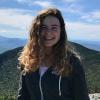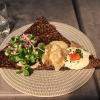If there’s one thing I’ve learned from study abroad, it’s that no day is the same. Each weekday and weekend brings new discoveries, changes, and events, and the key to enjoying the experience abroad is to embrace all those. In the United States, I find that my life is very mapped out between Google Calendar, meeting reminders, a regular alarm, and almost every hour of the day booked for something. Here in Nantes, it’s completely different. I rely on Google Calendar to remember class times, but for the most part, each day has a lot of freedom with which I can fill with time with friends, outdoors, or studying. So, here I’ve laid out what an average Friday might look like, because it helps to show the variance of activities I might have.
7:30 a.m.—My alarm goes off. I usually calculate more time than necessary in the mornings, so I might not get up right away. I’ll take a shower, make my bed, and get ready for the day.
8:15 a.m.—In my host family’s kitchen, I’ll make a simple breakfast of toast with jam. My host mother works in the evenings, so she will typically rise later than me in the mornings. I enjoy the independence in the mornings, and enjoy taking time in sipping my coffee slowly, admiring the bustle outside the kitchen window as people head to work and kids scooter past.
9:00 a.m.—I leave my apartment for the IES Abroad Center, where I have class. Some days I take the bus, but most days I walk because the route is lovely. I pass boulangeries, shops, gardens, and cute homes. The commute to walk is about 18 minutes, and at that hour might take equal time on the busy bus. When I do take the bus, I use Moovit, a very helpful app that calculates all the possible transportation routes in Nantes and is usually very reliable.
9:30 a.m.—My first class: French Grammar. It is a class of 14 American students. We meet in one of the classrooms of the IES Abroad Center for 1.5 hours Monday and Friday mornings. Usually, the class takes place here. Last week we happened to have a field trip to the Marche du Talensac (a permanent fish/meat/farmer’s market) where we had the opportunity to talk to many of the food vendors and ask questions. The class is usually based around grammar exercises, conversation, writing, and giving oral presentations, all to improve our language skills. All my classes are conducted completely in French.
11:00 a.m.—My second class: Sociology, Contemporary French Society. This is an even smaller class of four people, as IES Abroad Nantes is a relatively small program. In this way, it has become very interactive. We’ve covered topics of unemployment, immigration, women, education, and family structures in France, typically discussing the last 50 years or so. A few weeks ago we took a field trip to the Archives in Nantes to look at immigration documents to Nantes from the past 150 years. We were toured through their extensive basement of files, some of which are up to 600 years old. Last week we also went to a trial at the Palace of Justice (court house) in Nantes to see the justice system in France. We watched the hearing of a man who was being tried for stealing goods from a number of stores in Nantes. All the judges wore robes, and while it was a bit challenging to follow the technical law jargon in French, it was an interesting experience.
12:45 p.m.—My stomach starts to growl. Sometimes, I’ll make lunch in the IES Abroad kitchen from ingredients I’ve bought for the week. However, I often go to a boulangerie with friends to buy a sandwich or quiche. There is one located right down the street from the IES Abroad Center, so we’ll go there to pick up our lunches (and sometimes a dessert as well) and return to the Center kitchen to eat together.
1:30 p.m.—I head to my internship as an English teaching assistant in a local middle/high school, St. Stanislas. This was an opportunity offered through IES Abroad to learn more about education in France and gain experience as well. Four hours a week (two hours Monday and two hours Friday), I go to St. Stanislas and teach or assist English classes. We also have a two-hour pedagogy course on Wednesdays for all the IES Abroad interns to discuss the education system and our experiences. This Friday, I head to the school to work with the older kids, Troisième (14 years old) and Première (16 years old). I come with a presentation prepared and typically a worksheet or activity to do altogether as a class, which I’ve planned after discussion with the professor. This week, I bring a presentation about daily activities in the U.S., then I have the students work on small skits where they discuss their days. Each class is about 50 minutes long.
4:00 p.m.—My classes for the day are done. If I have errands to do such as mailing postcards or refilling my phone plan for the month, I’ll try to get some of those done, and then I’ll head home.
4:30 p.m.—When I get home, I might grab a small snack, then check some emails and do some work before the weekend begins. Then, I’ll probably take a short nap because I’m a big fan.
6:00 p.m.—Around this time, my friends and I will plan to meet up for the evening on a usual Friday. While restaurants typically don’t open in Nantes until around 7:00 or 8:00 p.m., we might get together sooner than that to hang out, or if there is an event. One of my favorite evenings with my friends was when we had a picnic on the banks of the Erdre River. I took the bus downtown, then the tram to meet them. That evening I was with four other American friends and one of our French friends, who also studies at the University of Nantes. We all went to a boulangerie and got some sandwiches to go, then we went to Carrefour (the popular city supermarket) for some cheap cookies or drinks. Then, we set up along the river. Along the Erdre, there are wooden platforms that have been created specifically for people to hang out. At this time of year, it is brimming with people enjoying the warm evening. Sunset in late April is around 9:00 p.m., so there are still many quality hours of daylight. We sat in a circle, ate our food, and played some card games as the sun set. The specific game we played was called “Jungle Speed”, a game requiring card matching and competition amongst friends.
9:45 p.m.—After it got too dark to play the game, we migrated further downtown and decided to go to Le Nid (the nest), a top-floor bar and viewing-point of Nantes. We talked more and caught up from the week.
11:30 p.m.—I take the bus home to my host mother’s apartment. Some days, I might not see her in the evenings, but usually we have dinner and lovely conversation together in the evenings during the week.
12:00 p.m.—I head to bed for the night, anticipating what new adventures the next day might bring.

Genevieve Winn
I remember creating things from a very young age. What began as duct tape figurines and short stories as a child have transformed into projects of scale today. One of my favorite activities is to sew, but I also love to write. Self-expression through art and writing has always been a strong part of my identity. My hope for the future is to bring my creativity into the world in new ways by creating relationships with people and helping to create solutions to real-world problems. Learning another language is, I think, an important piece to understanding the world a little better, and to knowing how to better serve the people in it. As an IES Correspondent, I hope my writing can help other students to understand study abroad, me, and the beautiful world around us through my daily adventures!








